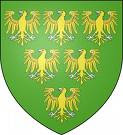The highlight of the BBC's Talk Tudor day for me was Suzannah Lipscomb's theory on the fall of Anne Boleyn. Later this month the BBC will show a drama/documentary on Anne's fall in which Suzannah takes part, and she recently wrote the cover article for April's BBC History magazine on Anne Boleyn. This post is a short precis on the theories highlighted by Suzannah.
1. That Anne was actually guilty. There is no credible evidence for this, and the only historian who seriously considers Anne to be guilty is G W Bernard. His recent book was titled 'Anne Boleyn: Fatal Attractions'. Snappy title, but with weak arguments for Anne's guilt. Bernard seems to be saying there was 'no smoke without fire' and thus condemns Anne. Even though the dates Anne was supposed to have committed adultery prove it impossible for her to have done so, Bernard even tries to make the argument that the actual dates don't really matter.
2. Thomas Cromwell conspired with the Seymours to displace Anne with Jane Seymour, and Anne's fall was the result of faction. Anne supposedly found out that Cromwell was syphoning off money from dissolved monasteries. This theory was the foundation of the recent Howard Brenton play 'Anne Boleyn'. Lipscomb discards this theory in that she feels it represents Henry as a king easily manipulated by his ministers and courtiers.
3. That Henry had tired of Anne, especially after her recent miscarriages, (although we don't know how many she had, and the report that the last one had been deformed can be discounted as being invented by the anti-Elizabeth Catholic Nicholas Sander), fallen in love with Jane Seymour and asked Thomas Cromwell to rid him of Anne. This is the theory that I have always subscribed to. I think Anne's age, and I think she was born in 1502, would have been against her in 1536, and having miscarried on possibly as many as 3 babies, Henry had tired of her, and his infatuation burnt out, decided to break from her. He didn't want to jeopardise any future children with Jane Seymour, and so it wasn't enough for Anne to be divorced, she had to die. She would never have gone quietly. The fact that Henry would allow himself to be seen as a cuckolded husband I put down to the choice and number of victims - that Anne was so full of lust, and so vile, no man was safe from her - a lowly musician, Henry's friends, and worst of all, her own brother.
4. Lipscomb believes that having been told by Thomas Cromwell there was gossip about his Queen, spread by Elizabeth, Lady Worcester, Henry instructed Cromwell to investigate, with the warning that should the gossip be untrue, he would destroy those who had spread malicious stories about Anne. This was certainly an incentive for Cromwell to 'find' evidence. What I find interesting about this theory is Lipscomb's take on Jane Seymour. There is evidence that Henry paid court to ladies of the court, and may have taken some as his mistress. Jane Seymour, by rejecting Henry in the first instance, became an idealised love for Henry - in the game of courtly love. Lipscomb believes Henry was not serious about her. And there is evidence that Anne's fall was sudden - and she had been in as much favour as ever with Henry in April 1536. Having been charged with finding evidence against Anne on pain of death, Cromwell made certain he found it, even if he invented it. The crux of Lipscomb's argument is the fall-out Anne had with Henry Norris, one of Henry's loyal friends. Chiding him for not marrying one of her ladies, Anne is reported to have said 'you look for dead men's shoes, for if ought came to the king, you would look to have me'. Playing her own games of courtly love, Anne had gone too far. Norris was appalled at what she said. Anne herself regretted what she had said in the Tower. It was treason to even 'imagine' the king's death, whilst Anne had actually spoken of it. It is this conversation that Lipscomb feels tipped Henry over the edge. After abruptly leaving the May day celebrations, Henry questioned Norris himself - there is a story he even offered Norris his life if he confessed. Norris would not. Lipscomb feels that this conversation did not convince Henry - in fact, it had the opposite effect, and he became convinced Anne was guilty. Lipscomb feels that Henry married Jane Seymour on the re-bound - he was certainly heard to regret his marriage when commenting there were other beautiful ladies at the court and he had married too hastily. Hmmm, so Henry could play courtly love games, but not Anne!
Despite the countless books, films, tv programmes, we still don't know why Anne Boleyn fell. Evidence has either been destroyed or lost. I still think theory number 3 the most obvious, but look forward to reading more about theory number 4. I asked Suzannah Lipscomb if she intended to write her own book on Anne Boleyn, but she said no. I really think she should!
2 weeks ago



3 comments:
Very interesting points! I do agree about point 3. Henry was desperate to sire a healthy male heir to the throne. Taking into consideration Anne's age and the number of miscarriages, there must have been dark clouds gathering on Henry's horizon. What's more, memories of his first marriage were probably still fresh enough to make him act decisively. This is at least how I see it.
Oh, and you're right- Miss Lipscomb should make it all into a book. Definitely!
Yeah Kasia, I'd go for number 3. Henry must have felt humiliated/anxious that after 3 years he only had 1 daughter and a series of miscarriages. It's just the speed of Anne's fall that shocks me.
I really enjoy Suzannah Lipscomb's style of presenting and her book '1536'.
Post a Comment